Trutane family homepage
Our 1999 Germany Trip
Here are some pictures from a trip Kim and I took to Germany in August
of 1999. We visited Heidelberg (where I attended the
ISMB meeting) and also
visited Rothenburg, Munich, and Trier, and various cities and castles
along the Rhine and Mosel River Valleys. Kim wrote the nice descriptions
that go with the pictures.
There are quite a few images so be patient while the page
loads if you have a slow connection.
- The Rhine Castles
- This trip came about because Steve had a conference to
attend in Germany (see above). I decided to come along and Steve took
a few extra days off work so we could have a real
vacation. Before the conference started we had a couple
of days to explore the Rhine and Mosel River Valleys.
-
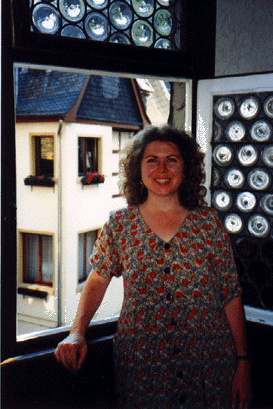 Our first stop was a village on the Rhine.
We stayed in one of the old towers of the city wall. The
windows were hundreds of years old and made by the simple
method of blowing and flattening circles of glass.
Our first stop was a village on the Rhine.
We stayed in one of the old towers of the city wall. The
windows were hundreds of years old and made by the simple
method of blowing and flattening circles of glass. -
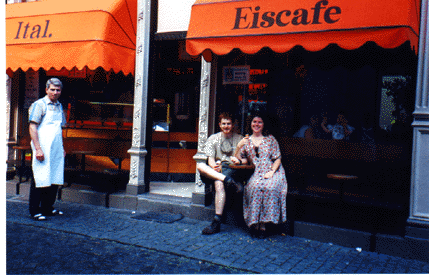 After making sure we had a room, the next
order of business was getting ice cream.
After making sure we had a room, the next
order of business was getting ice cream.- This little girl was taking her stuffed dog out for a
walk on the cobblestone streets. The old wall with these
narrow gates surrounded part of the town. Although cars
drive through the gates now, it was easy to imagine m
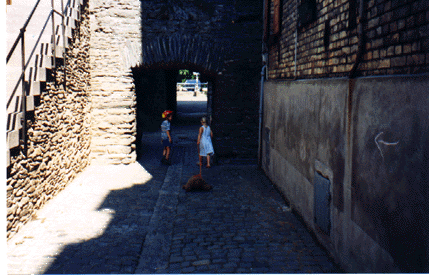 edieval soldiers with pikestaffs guarding
them.
edieval soldiers with pikestaffs guarding
them.
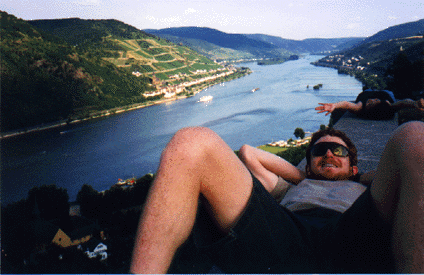 With the ice cream sustaining us, we hiked
up to the old castle above the town. Here's the Rhine!
With the ice cream sustaining us, we hiked
up to the old castle above the town. Here's the Rhine!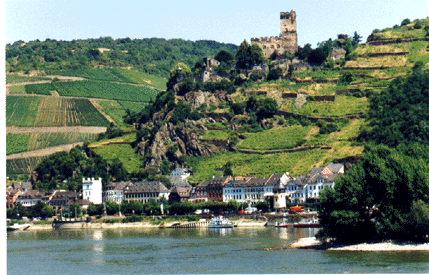 We rented bikes the next day and rode
alongside the river. We past many small towns like this.
We rented bikes the next day and rode
alongside the river. We past many small towns like this.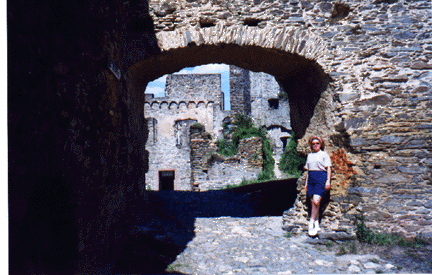 Our goal was the ruin of a mighty castle
called Rheinsfelds. Here I am in one of the many gates.
Our goal was the ruin of a mighty castle
called Rheinsfelds. Here I am in one of the many gates.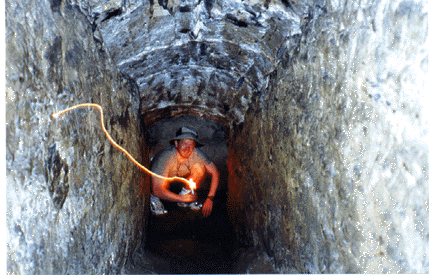 Weird picture! Rheinsfeld has miles of
tunnels that extend out underneath the fields surrounding
the castle. In the olden days, these were used to sneak
soldiers out behind the enemy. If the enemy army was
camped above a tunnel, it could be filled with explosives
and detonated. There are no signs, you have to know about
the tunnels, but there are no barriers either. The gift
shop will sell you a candle for fifty cents. So off we
went exploring... I combined a flash with holding the
shutter open to get this shot, because the tunnels were
pitch black.
Weird picture! Rheinsfeld has miles of
tunnels that extend out underneath the fields surrounding
the castle. In the olden days, these were used to sneak
soldiers out behind the enemy. If the enemy army was
camped above a tunnel, it could be filled with explosives
and detonated. There are no signs, you have to know about
the tunnels, but there are no barriers either. The gift
shop will sell you a candle for fifty cents. So off we
went exploring... I combined a flash with holding the
shutter open to get this shot, because the tunnels were
pitch black.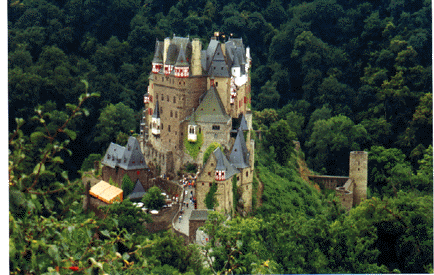 Ahhh...the next day we went to Burg Eltz
castle. This could be a demonstration that tongue is
stronger than the sword. Rheinsfeld was mighty, but
eventually was destroyed. Eltz has survived through
strategic marriages, diplomacy, and because it was a
lesser castle, off the major rivers. It has been owned by
the same family for 700 years.
Ahhh...the next day we went to Burg Eltz
castle. This could be a demonstration that tongue is
stronger than the sword. Rheinsfeld was mighty, but
eventually was destroyed. Eltz has survived through
strategic marriages, diplomacy, and because it was a
lesser castle, off the major rivers. It has been owned by
the same family for 700 years.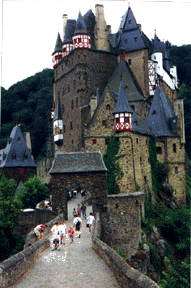 Because it was never destroyed, it's a great
way to see what castles really looked like. They built
half-timbered structures above the stone walls with all
the pretty painting you see here.
Because it was never destroyed, it's a great
way to see what castles really looked like. They built
half-timbered structures above the stone walls with all
the pretty painting you see here.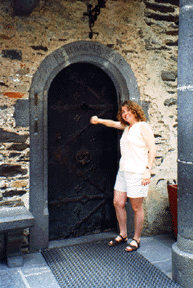 The guidebook said they won't give tours in
English unless you ask and organize your fellow
English-speaking tourists into a group of twenty. So I
did! It was a little scary, but everyone appreciated it
and we all got a lot more out of our visit. Sorry, they
didn't allow pictures inside. It was fabulous, but you'll
just have to go see it yourself.
The guidebook said they won't give tours in
English unless you ask and organize your fellow
English-speaking tourists into a group of twenty. So I
did! It was a little scary, but everyone appreciated it
and we all got a lot more out of our visit. Sorry, they
didn't allow pictures inside. It was fabulous, but you'll
just have to go see it yourself.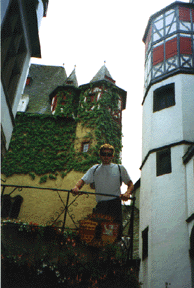 Here's Steve in the inner courtyard.
Here's Steve in the inner courtyard.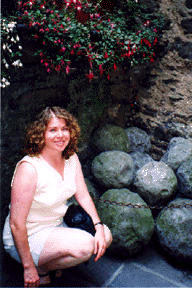 These are called siege balls. When they
fought by surrounding a castle and starving the
inhabitants into submission, these rocks were flung back
and forth by huge catapults.
These are called siege balls. When they
fought by surrounding a castle and starving the
inhabitants into submission, these rocks were flung back
and forth by huge catapults.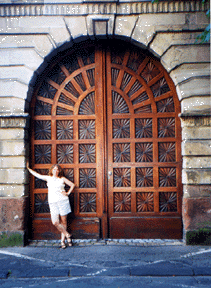 We went to Trier, the northernmost capital
of the Roman Empire. They have awesome ruins there, but
all we ended up taking a picture of was this massive
door. Go figure....
We went to Trier, the northernmost capital
of the Roman Empire. They have awesome ruins there, but
all we ended up taking a picture of was this massive
door. Go figure....-
- Heidelburg
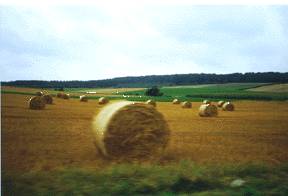 Steve's conference was starting so we drove
into heidelburg. Most of Germany seemed to be
agricultural. We saw many fields like this from the
autobahn. How was the driving? Great! The German drivers
obeyed the rules and strictly adhered to the system of
slower cars on the right, pass on the left. Not like the
utter chaos we are used to in the Bay Area. We also never
found heavy traffic.
Steve's conference was starting so we drove
into heidelburg. Most of Germany seemed to be
agricultural. We saw many fields like this from the
autobahn. How was the driving? Great! The German drivers
obeyed the rules and strictly adhered to the system of
slower cars on the right, pass on the left. Not like the
utter chaos we are used to in the Bay Area. We also never
found heavy traffic. 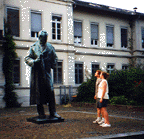 heidelburg is both a modern and an old city.
We were staying in the old university town. This is a
statue of Bunsen, the inventor of the Bunsen burner.
Evidently he knew that Steve and I occasionally forgot to
turn ours off.
heidelburg is both a modern and an old city.
We were staying in the old university town. This is a
statue of Bunsen, the inventor of the Bunsen burner.
Evidently he knew that Steve and I occasionally forgot to
turn ours off.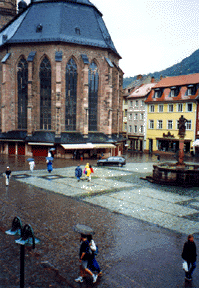 The hotel that we had reserved for the week
was dreadful, so we ended up jumping from hotel to hotel,
a night or two at each. This shot was taken from the
window of our room on the Corn Market square. Only a half
hour before the square was covered with cafe tables with
bright umbrellas and packed with people. The rain cleared
it out, and all the cafes pulled their tables in. That's
the end of the church that you see. It seems that the
church was built with those little shops with the red
doors on the outside. Our guide on the walking tour also
told us that when Germany was split between Catholics and
Protestants during the Reformation, a wall was built down
the center of this church. It solved the problem of who
would get the church. Another interesting thing the guide
said was this square was where the witches were burnt at
the stake. I asked if Heidelburg had a lot of witches,
and the guide said, oh, the normal number for a city this
size.
The hotel that we had reserved for the week
was dreadful, so we ended up jumping from hotel to hotel,
a night or two at each. This shot was taken from the
window of our room on the Corn Market square. Only a half
hour before the square was covered with cafe tables with
bright umbrellas and packed with people. The rain cleared
it out, and all the cafes pulled their tables in. That's
the end of the church that you see. It seems that the
church was built with those little shops with the red
doors on the outside. Our guide on the walking tour also
told us that when Germany was split between Catholics and
Protestants during the Reformation, a wall was built down
the center of this church. It solved the problem of who
would get the church. Another interesting thing the guide
said was this square was where the witches were burnt at
the stake. I asked if Heidelburg had a lot of witches,
and the guide said, oh, the normal number for a city this
size.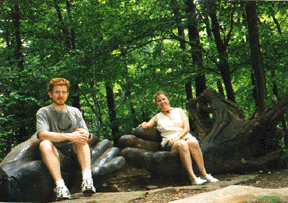 You know Steve and me. On his one afternoon
free we went hiking. This bench was carved out of two
tree trunks.
You know Steve and me. On his one afternoon
free we went hiking. This bench was carved out of two
tree trunks.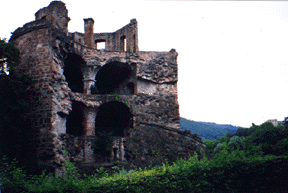 heidelburg's castle was destroyed but has
been partially restored. This small tower (you should see
the rest of the castle) held the gunpowder. When it blew,
the whole outer portion of the tower flew out and down.
You can see the top edge of it sticking out of the moat.
heidelburg's castle was destroyed but has
been partially restored. This small tower (you should see
the rest of the castle) held the gunpowder. When it blew,
the whole outer portion of the tower flew out and down.
You can see the top edge of it sticking out of the moat.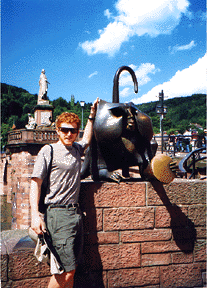 A sunny day! We saw some of the tourist's
sites. This monkey is the symbol of the city. Steve felt
like he really became a part of heidelburg during our
visit.
A sunny day! We saw some of the tourist's
sites. This monkey is the symbol of the city. Steve felt
like he really became a part of heidelburg during our
visit.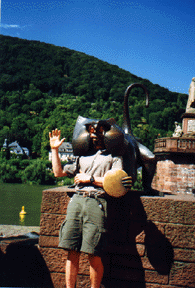
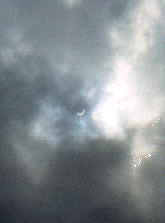 The conference ended with a day trip to see
the eclipse. We went to a manor home and had a lovely
lawn party. The clouds cooperated most of the time--we
were quite lucky. This cloudy time was our chance to take
a picture of it without a special lens.
The conference ended with a day trip to see
the eclipse. We went to a manor home and had a lovely
lawn party. The clouds cooperated most of the time--we
were quite lucky. This cloudy time was our chance to take
a picture of it without a special lens.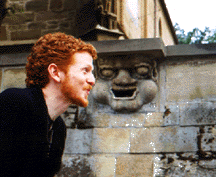 Steve cheered up this grumpy old carving
with a kiss. Shows you that everybody needs a little
love.
Steve cheered up this grumpy old carving
with a kiss. Shows you that everybody needs a little
love.
- Rothenburg
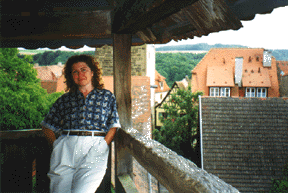 Rothenburg was truly one of the high points
of the trip, but you wouldn't know it from our pictures.
It's a time-capsule town. It was one of the largest
cities in medieval times, but its population was
decimated in by the plague and during the Thirty Year's
War. The town fell out of public view, emerging 600 years
later as a complete, intact medieval city. I love this
picture Steve took of me on the city wall, looking across
town.
Rothenburg was truly one of the high points
of the trip, but you wouldn't know it from our pictures.
It's a time-capsule town. It was one of the largest
cities in medieval times, but its population was
decimated in by the plague and during the Thirty Year's
War. The town fell out of public view, emerging 600 years
later as a complete, intact medieval city. I love this
picture Steve took of me on the city wall, looking across
town. -
- Munich
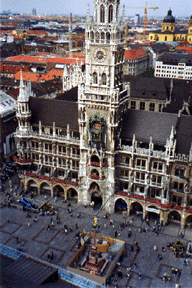 We spent the last two nights of our trip in
Munich. By this time I was finished climbing towers, but
I'm glad Steve took this picture so I can see the
magnificent view he got of central Munich.
We spent the last two nights of our trip in
Munich. By this time I was finished climbing towers, but
I'm glad Steve took this picture so I can see the
magnificent view he got of central Munich.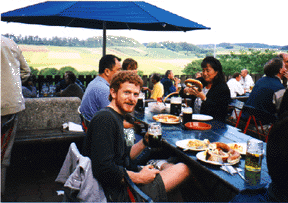 We drove out to Andechs, an ancient
monastery. We saw the monks in the brown robes file into
the church and chant the service in Latin. That was
amazing. But these monks haven't just taken orders,
they'll also take your order. Their mission is to brew
beer, and they do a heavenly job of it. Here's Steve in
the beer garden. Note the large pretzels and the small
"taster" mugs of beer.
We drove out to Andechs, an ancient
monastery. We saw the monks in the brown robes file into
the church and chant the service in Latin. That was
amazing. But these monks haven't just taken orders,
they'll also take your order. Their mission is to brew
beer, and they do a heavenly job of it. Here's Steve in
the beer garden. Note the large pretzels and the small
"taster" mugs of beer.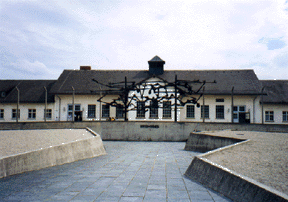 On our last day we went to visit the Dauchau
concentration camp. It was an awful experience and I hope
everyone who visits will come away forever changed. It is
our responsibility to know what our government is doing.
This memorial sculpture is titled "Men in the
Wire" and refers to the method of suicide the men
sometimes used of jumping into the electrified fence.
On our last day we went to visit the Dauchau
concentration camp. It was an awful experience and I hope
everyone who visits will come away forever changed. It is
our responsibility to know what our government is doing.
This memorial sculpture is titled "Men in the
Wire" and refers to the method of suicide the men
sometimes used of jumping into the electrified fence.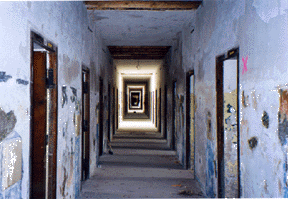 Here is the hallway of the prison unit.
Here is the hallway of the prison unit.- We took no more pictures after this, but I can tell you
that after several very quiet hours in the car, we
decided to make a reviving stop in the spa town of
Baden-Baden, which was less that an hour out of the way.
I had been twice to the pools while we were staying in
heidelburg and they were fun and great for my back. I was
glad to spend some time there with Steve. After that, it
was on to the airport and back to California!
Copyright (c) 1999-2007 Steve & Kim Trutane.
Last revised:
2007-07-27
 Our first stop was a village on the Rhine.
We stayed in one of the old towers of the city wall. The
windows were hundreds of years old and made by the simple
method of blowing and flattening circles of glass.
Our first stop was a village on the Rhine.
We stayed in one of the old towers of the city wall. The
windows were hundreds of years old and made by the simple
method of blowing and flattening circles of glass.  After making sure we had a room, the next
order of business was getting ice cream.
After making sure we had a room, the next
order of business was getting ice cream. edieval soldiers with pikestaffs guarding
them.
edieval soldiers with pikestaffs guarding
them.  With the ice cream sustaining us, we hiked
up to the old castle above the town. Here's the Rhine!
With the ice cream sustaining us, we hiked
up to the old castle above the town. Here's the Rhine! We rented bikes the next day and rode
alongside the river. We past many small towns like this.
We rented bikes the next day and rode
alongside the river. We past many small towns like this. Our goal was the ruin of a mighty castle
called Rheinsfelds. Here I am in one of the many gates.
Our goal was the ruin of a mighty castle
called Rheinsfelds. Here I am in one of the many gates. Weird picture! Rheinsfeld has miles of
tunnels that extend out underneath the fields surrounding
the castle. In the olden days, these were used to sneak
soldiers out behind the enemy. If the enemy army was
camped above a tunnel, it could be filled with explosives
and detonated. There are no signs, you have to know about
the tunnels, but there are no barriers either. The gift
shop will sell you a candle for fifty cents. So off we
went exploring... I combined a flash with holding the
shutter open to get this shot, because the tunnels were
pitch black.
Weird picture! Rheinsfeld has miles of
tunnels that extend out underneath the fields surrounding
the castle. In the olden days, these were used to sneak
soldiers out behind the enemy. If the enemy army was
camped above a tunnel, it could be filled with explosives
and detonated. There are no signs, you have to know about
the tunnels, but there are no barriers either. The gift
shop will sell you a candle for fifty cents. So off we
went exploring... I combined a flash with holding the
shutter open to get this shot, because the tunnels were
pitch black. Ahhh...the next day we went to Burg Eltz
castle. This could be a demonstration that tongue is
stronger than the sword. Rheinsfeld was mighty, but
eventually was destroyed. Eltz has survived through
strategic marriages, diplomacy, and because it was a
lesser castle, off the major rivers. It has been owned by
the same family for 700 years.
Ahhh...the next day we went to Burg Eltz
castle. This could be a demonstration that tongue is
stronger than the sword. Rheinsfeld was mighty, but
eventually was destroyed. Eltz has survived through
strategic marriages, diplomacy, and because it was a
lesser castle, off the major rivers. It has been owned by
the same family for 700 years. Because it was never destroyed, it's a great
way to see what castles really looked like. They built
half-timbered structures above the stone walls with all
the pretty painting you see here.
Because it was never destroyed, it's a great
way to see what castles really looked like. They built
half-timbered structures above the stone walls with all
the pretty painting you see here. The guidebook said they won't give tours in
English unless you ask and organize your fellow
English-speaking tourists into a group of twenty. So I
did! It was a little scary, but everyone appreciated it
and we all got a lot more out of our visit. Sorry, they
didn't allow pictures inside. It was fabulous, but you'll
just have to go see it yourself.
The guidebook said they won't give tours in
English unless you ask and organize your fellow
English-speaking tourists into a group of twenty. So I
did! It was a little scary, but everyone appreciated it
and we all got a lot more out of our visit. Sorry, they
didn't allow pictures inside. It was fabulous, but you'll
just have to go see it yourself. Here's Steve in the inner courtyard.
Here's Steve in the inner courtyard. These are called siege balls. When they
fought by surrounding a castle and starving the
inhabitants into submission, these rocks were flung back
and forth by huge catapults.
These are called siege balls. When they
fought by surrounding a castle and starving the
inhabitants into submission, these rocks were flung back
and forth by huge catapults. We went to Trier, the northernmost capital
of the Roman Empire. They have awesome ruins there, but
all we ended up taking a picture of was this massive
door. Go figure....
We went to Trier, the northernmost capital
of the Roman Empire. They have awesome ruins there, but
all we ended up taking a picture of was this massive
door. Go figure.... Steve's conference was starting so we drove
into heidelburg. Most of Germany seemed to be
agricultural. We saw many fields like this from the
autobahn. How was the driving? Great! The German drivers
obeyed the rules and strictly adhered to the system of
slower cars on the right, pass on the left. Not like the
utter chaos we are used to in the Bay Area. We also never
found heavy traffic.
Steve's conference was starting so we drove
into heidelburg. Most of Germany seemed to be
agricultural. We saw many fields like this from the
autobahn. How was the driving? Great! The German drivers
obeyed the rules and strictly adhered to the system of
slower cars on the right, pass on the left. Not like the
utter chaos we are used to in the Bay Area. We also never
found heavy traffic.  heidelburg is both a modern and an old city.
We were staying in the old university town. This is a
statue of Bunsen, the inventor of the Bunsen burner.
Evidently he knew that Steve and I occasionally forgot to
turn ours off.
heidelburg is both a modern and an old city.
We were staying in the old university town. This is a
statue of Bunsen, the inventor of the Bunsen burner.
Evidently he knew that Steve and I occasionally forgot to
turn ours off. The hotel that we had reserved for the week
was dreadful, so we ended up jumping from hotel to hotel,
a night or two at each. This shot was taken from the
window of our room on the Corn Market square. Only a half
hour before the square was covered with cafe tables with
bright umbrellas and packed with people. The rain cleared
it out, and all the cafes pulled their tables in. That's
the end of the church that you see. It seems that the
church was built with those little shops with the red
doors on the outside. Our guide on the walking tour also
told us that when Germany was split between Catholics and
Protestants during the Reformation, a wall was built down
the center of this church. It solved the problem of who
would get the church. Another interesting thing the guide
said was this square was where the witches were burnt at
the stake. I asked if Heidelburg had a lot of witches,
and the guide said, oh, the normal number for a city this
size.
The hotel that we had reserved for the week
was dreadful, so we ended up jumping from hotel to hotel,
a night or two at each. This shot was taken from the
window of our room on the Corn Market square. Only a half
hour before the square was covered with cafe tables with
bright umbrellas and packed with people. The rain cleared
it out, and all the cafes pulled their tables in. That's
the end of the church that you see. It seems that the
church was built with those little shops with the red
doors on the outside. Our guide on the walking tour also
told us that when Germany was split between Catholics and
Protestants during the Reformation, a wall was built down
the center of this church. It solved the problem of who
would get the church. Another interesting thing the guide
said was this square was where the witches were burnt at
the stake. I asked if Heidelburg had a lot of witches,
and the guide said, oh, the normal number for a city this
size. You know Steve and me. On his one afternoon
free we went hiking. This bench was carved out of two
tree trunks.
You know Steve and me. On his one afternoon
free we went hiking. This bench was carved out of two
tree trunks. heidelburg's castle was destroyed but has
been partially restored. This small tower (you should see
the rest of the castle) held the gunpowder. When it blew,
the whole outer portion of the tower flew out and down.
You can see the top edge of it sticking out of the moat.
heidelburg's castle was destroyed but has
been partially restored. This small tower (you should see
the rest of the castle) held the gunpowder. When it blew,
the whole outer portion of the tower flew out and down.
You can see the top edge of it sticking out of the moat. A sunny day! We saw some of the tourist's
sites. This monkey is the symbol of the city. Steve felt
like he really became a part of heidelburg during our
visit.
A sunny day! We saw some of the tourist's
sites. This monkey is the symbol of the city. Steve felt
like he really became a part of heidelburg during our
visit.
 The conference ended with a day trip to see
the eclipse. We went to a manor home and had a lovely
lawn party. The clouds cooperated most of the time--we
were quite lucky. This cloudy time was our chance to take
a picture of it without a special lens.
The conference ended with a day trip to see
the eclipse. We went to a manor home and had a lovely
lawn party. The clouds cooperated most of the time--we
were quite lucky. This cloudy time was our chance to take
a picture of it without a special lens. Steve cheered up this grumpy old carving
with a kiss. Shows you that everybody needs a little
love.
Steve cheered up this grumpy old carving
with a kiss. Shows you that everybody needs a little
love. Rothenburg was truly one of the high points
of the trip, but you wouldn't know it from our pictures.
It's a time-capsule town. It was one of the largest
cities in medieval times, but its population was
decimated in by the plague and during the Thirty Year's
War. The town fell out of public view, emerging 600 years
later as a complete, intact medieval city. I love this
picture Steve took of me on the city wall, looking across
town.
Rothenburg was truly one of the high points
of the trip, but you wouldn't know it from our pictures.
It's a time-capsule town. It was one of the largest
cities in medieval times, but its population was
decimated in by the plague and during the Thirty Year's
War. The town fell out of public view, emerging 600 years
later as a complete, intact medieval city. I love this
picture Steve took of me on the city wall, looking across
town.  We spent the last two nights of our trip in
Munich. By this time I was finished climbing towers, but
I'm glad Steve took this picture so I can see the
magnificent view he got of central Munich.
We spent the last two nights of our trip in
Munich. By this time I was finished climbing towers, but
I'm glad Steve took this picture so I can see the
magnificent view he got of central Munich. We drove out to Andechs, an ancient
monastery. We saw the monks in the brown robes file into
the church and chant the service in Latin. That was
amazing. But these monks haven't just taken orders,
they'll also take your order. Their mission is to brew
beer, and they do a heavenly job of it. Here's Steve in
the beer garden. Note the large pretzels and the small
"taster" mugs of beer.
We drove out to Andechs, an ancient
monastery. We saw the monks in the brown robes file into
the church and chant the service in Latin. That was
amazing. But these monks haven't just taken orders,
they'll also take your order. Their mission is to brew
beer, and they do a heavenly job of it. Here's Steve in
the beer garden. Note the large pretzels and the small
"taster" mugs of beer. On our last day we went to visit the Dauchau
concentration camp. It was an awful experience and I hope
everyone who visits will come away forever changed. It is
our responsibility to know what our government is doing.
This memorial sculpture is titled "Men in the
Wire" and refers to the method of suicide the men
sometimes used of jumping into the electrified fence.
On our last day we went to visit the Dauchau
concentration camp. It was an awful experience and I hope
everyone who visits will come away forever changed. It is
our responsibility to know what our government is doing.
This memorial sculpture is titled "Men in the
Wire" and refers to the method of suicide the men
sometimes used of jumping into the electrified fence. Here is the hallway of the prison unit.
Here is the hallway of the prison unit.